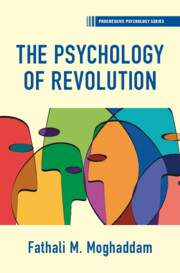Book contents
- The Psychology of Revolution
- The Progressive Psychology Book Series
- The Psychology of Revolution
- Copyright page
- Dedication
- Epigraph
- Contents
- Figures
- Preface
- Acknowledgments
- Chapter 1 A Psychological Perspective on the Puzzle of Revolution
- Part I Getting to Revolutionary Collective Action
- Part II Regime Change
- Part III What Happens after Revolutionary Regime Change?
- Part IV Reevaluating Revolutions
- Chapter 10 The Illusion-Motivation Model of Revolution
- Chapter 11 Does Human Nature Doom Revolutions?
- Afterword: Revolutions as Acts of Collective Creativity
- Notes
- References
- Index
Chapter 11 - Does Human Nature Doom Revolutions?
from Part IV - Reevaluating Revolutions
Published online by Cambridge University Press: 07 March 2024
- The Psychology of Revolution
- The Progressive Psychology Book Series
- The Psychology of Revolution
- Copyright page
- Dedication
- Epigraph
- Contents
- Figures
- Preface
- Acknowledgments
- Chapter 1 A Psychological Perspective on the Puzzle of Revolution
- Part I Getting to Revolutionary Collective Action
- Part II Regime Change
- Part III What Happens after Revolutionary Regime Change?
- Part IV Reevaluating Revolutions
- Chapter 10 The Illusion-Motivation Model of Revolution
- Chapter 11 Does Human Nature Doom Revolutions?
- Afterword: Revolutions as Acts of Collective Creativity
- Notes
- References
- Index
Summary
This chapter addresses the limitations potentially placed on the success of revolutions by “human nature” - which in psychological terms are the hard-wired characteristics that limit change in behavior. It is argued that in the long term, even behaviors that we conceptualize as hardwired at present tend to change (particularly through changes in the environment). The avowed goals of the French, Russian, Chinese, Cuban, and Iranian revolutions are examined, and it is concluded that none of these revolutions achieved their goals. Despite failure, the regimes that survive in China, Cuba, and Iran continue to use the rhetoric of revolution. Four ways in which human nature seems to doom revolutions are considered: extremists come to power; an “ends justify the means” approach is adopted and corruption results; the style of leader–follower relations persist after revolutions, with the result that one dictatorship replaces another; and revolutionaries typically fail to set up the necessary conditions to achieve the behavioral changes necessary to reach their revolutionary goals (such as collectivization).
Keywords
- Type
- Chapter
- Information
- The Psychology of Revolution , pp. 170 - 186Publisher: Cambridge University PressPrint publication year: 2024



